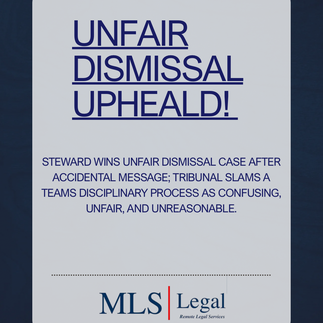Unfair Dismissal Ruling Against Norwich City FC Highlights Importance of Fair Disciplinary Processes
- mlslegalservices
- Jun 19, 2025
- 4 min read
In an fairly recent employment tribunal decision, Norwich City Football Club (NCFC) was found to have unfairly dismissed a long-serving steward, Gennaro Romano, after he mistakenly sent an inappropriate image to a senior staff member. The tribunal concluded that the club’s disciplinary procedure was deeply flawed and failed to follow basic principles of fairness, transparency, and proportionality.
Romano, who had volunteered and worked as a steward for NCFC in his spare time since 2011, was dismissed in November 2023. The incident in question involved the accidental forwarding of an image depicting politicians Diane Abbott MP and Nicola Sturgeon MSP, accompanied by commentary relating to comedian Russell Brand. The image was intended for a friend with a similar name to the unintended recipient, Neil Hunter, who is the club’s head of academy operations.
When the mistake came to light, Romano immediately recognised the seriousness of the situation. He admitted his error, acknowledged the content was inappropriate, and issued multiple apologies. Despite this, the club initiated disciplinary proceedings, ultimately concluding that he had shown insufficient remorse. They subsequently terminated his position for breaching the club’s code of conduct.
The employment tribunal, however, took a very different view. In a detailed ruling, the judges sharply criticised the way in which the club handled the investigation and disciplinary process. They noted that Romano had an unblemished record over more than a decade of service and that the message was not intended for a colleague. The tribunal accepted that the incident was a genuine mistake and pointed out that Romano had consistently apologised and taken responsibility for his actions.
One of the key criticisms levelled at NCFC was its interpretation of its disciplinary policy. The tribunal highlighted that there was no clause in the club’s handbook which stated that a private message, sent outside of work hours and intended for someone else, could amount to gross misconduct. The judges described the club’s interpretation of the rules as “Orwellian,” suggesting it was an overreach to equate a mistaken private communication with grounds for summary dismissal.
Further procedural failings were also identified. The tribunal found that the club had ignored a positive character reference provided during the disciplinary proceedings. Additionally, Romano’s direct line manager was not consulted, and no attempt was made to gather contextual information about his general conduct and service to the club. The judges found it troubling that such a one-sided approach had been adopted, especially given the serious consequences at stake.
The tribunal was also highly critical of the way Romano was questioned during disciplinary meetings. He reported being confused by the process, and the judges agreed that this confusion was justified, stating that the line of questioning adopted by the club was inherently unclear. The failure to provide clarity or support during these meetings further contributed to the tribunal’s finding that the dismissal was both unfair and unreasonable.
While Romano also alleged race discrimination, citing that English is his second language and that he is of Italian origin, this part of his claim was not upheld. The tribunal found no evidence that he was treated less favourably on the basis of his race or nationality. However, this did not detract from the central finding that the dismissal itself failed to meet legal standards of fairness.
NCFC has declined to comment on the outcome of the tribunal. However, the decision serves as a strong reminder to employers across all sectors, particularly those in high-profile industries such as sport, of the importance of maintaining a fair and lawful disciplinary process. Disciplinary actions must be proportionate, evidence-based, and procedurally sound. Where an employee has demonstrated a genuine mistake, especially one made in a private capacity and followed by clear contrition, a more considered approach is often legally and ethically appropriate.
This case underscores the value of clear policies, robust HR guidance, and a fair opportunity for the employee to respond and be heard. A failure in these areas can not only lead to legal liability but also reputational damage and unnecessary conflict within an organisation.
For employees, this case provides reassurance that legal protections exist against unjust treatment and unfair dismissals. It also illustrates the value of seeking legal support early in the process. Romano’s persistence in pursuing his rights through the tribunal system ultimately resulted in a finding in his favour, despite the significant power imbalance between an individual and a football club.
At a broader level, the case reflects growing scrutiny of workplace cultures and the importance of balancing organisational values with fairness and proportionality. Employers must be careful not to apply disciplinary measures in a way that appears rigid, punitive, or lacking empathy for human error.
For legal practitioners and HR professionals alike, this tribunal judgment will serve as a case study in the necessity of clear disciplinary policies, procedural fairness, and a balanced approach to employee conduct that recognises context, intent, and history.
Employees facing similar situations should be aware that they have rights and avenues for recourse. Where mistakes are genuine and apologies sincere, the law provides protection against overreach and unfair treatment.
_edited_edited_edited_.jpg)






Comments